University Assignment: Sociology and Arts - Catholic Social Thought
VerifiedAdded on 2023/04/08
|6
|1249
|86
Essay
AI Summary
This essay explores five key principles of Catholic Social Thought: the common good, dignity of the human person, preferential option for the poor, subsidiarity, and the universal purpose of goods. The paper argues that these principles are essential for individual and community development, fostering a better society through active participation from its residents. The common good is presented as a foundational principle linked to human dignity, promoting interdependence and societal growth. The essay emphasizes the equality of all human beings, as preached by the Church, and the importance of all-round development. It highlights the preferential option for the poor, advocating for the wealthier sections of society to assist the underprivileged. The principle of subsidiarity is discussed in terms of proper task allocation within society, and the essay concludes by advising Christians to engage in charitable activities, focusing on societal needs over materialistic factors.
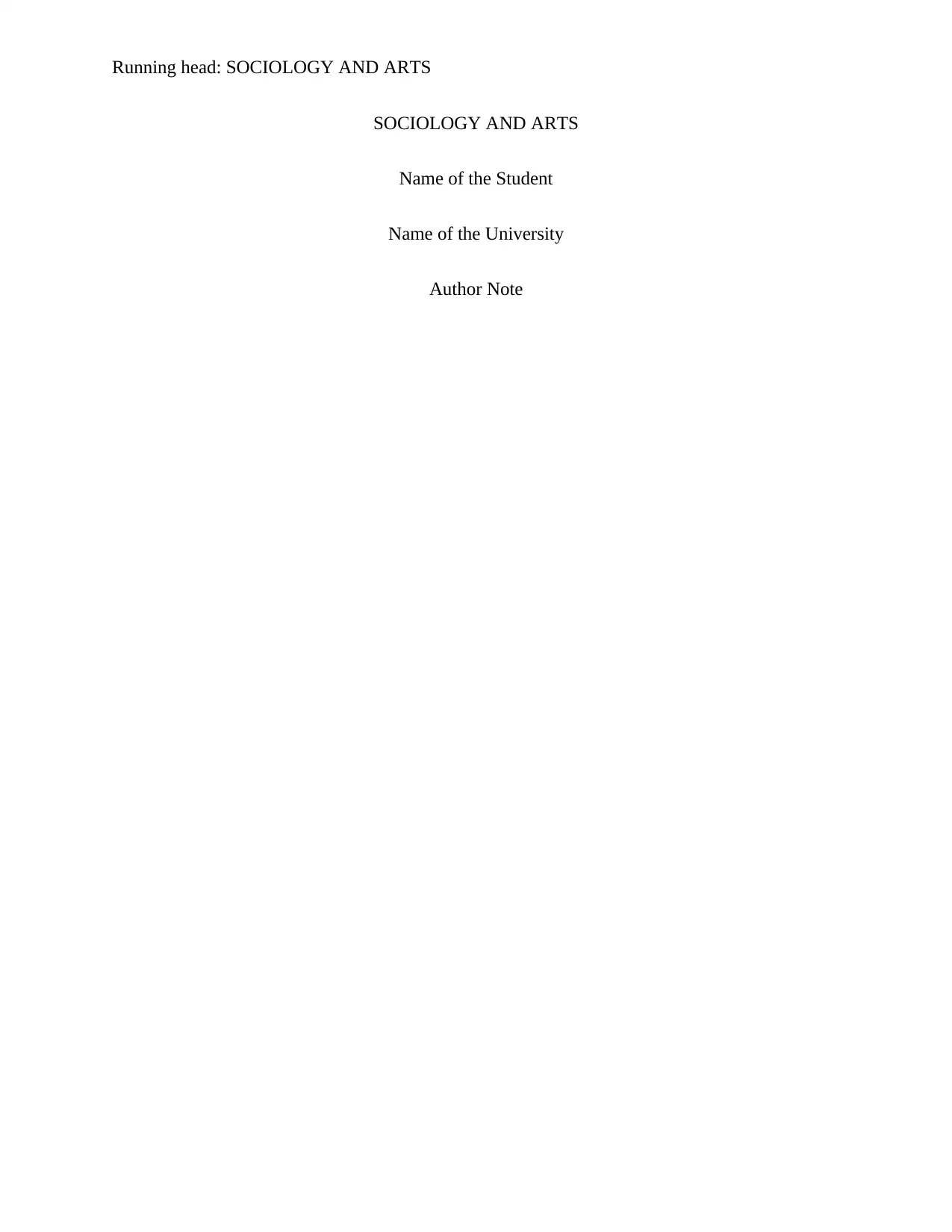
Running head: SOCIOLOGY AND ARTS
SOCIOLOGY AND ARTS
Name of the Student
Name of the University
Author Note
SOCIOLOGY AND ARTS
Name of the Student
Name of the University
Author Note
Paraphrase This Document
Need a fresh take? Get an instant paraphrase of this document with our AI Paraphraser
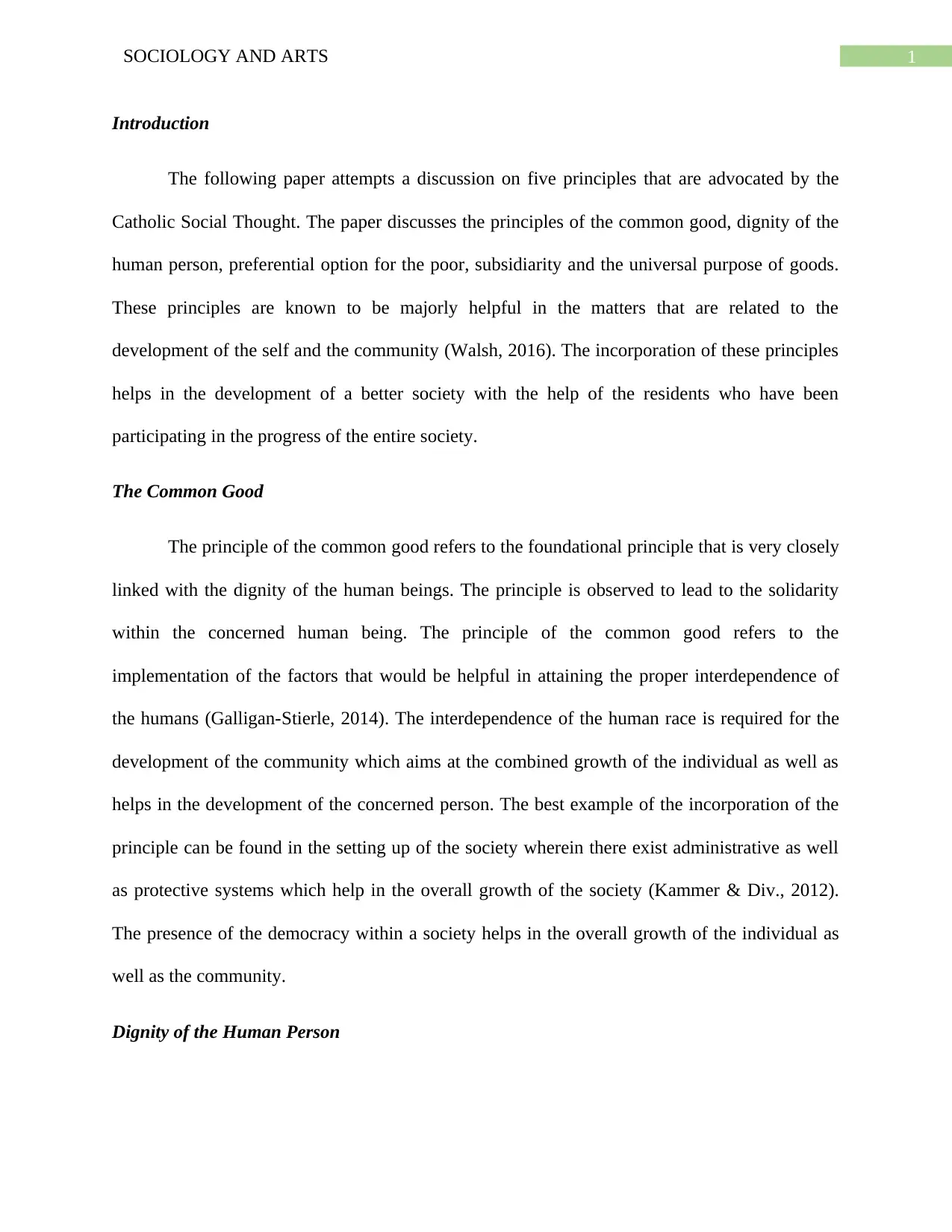
1SOCIOLOGY AND ARTS
Introduction
The following paper attempts a discussion on five principles that are advocated by the
Catholic Social Thought. The paper discusses the principles of the common good, dignity of the
human person, preferential option for the poor, subsidiarity and the universal purpose of goods.
These principles are known to be majorly helpful in the matters that are related to the
development of the self and the community (Walsh, 2016). The incorporation of these principles
helps in the development of a better society with the help of the residents who have been
participating in the progress of the entire society.
The Common Good
The principle of the common good refers to the foundational principle that is very closely
linked with the dignity of the human beings. The principle is observed to lead to the solidarity
within the concerned human being. The principle of the common good refers to the
implementation of the factors that would be helpful in attaining the proper interdependence of
the humans (Galligan-Stierle, 2014). The interdependence of the human race is required for the
development of the community which aims at the combined growth of the individual as well as
helps in the development of the concerned person. The best example of the incorporation of the
principle can be found in the setting up of the society wherein there exist administrative as well
as protective systems which help in the overall growth of the society (Kammer & Div., 2012).
The presence of the democracy within a society helps in the overall growth of the individual as
well as the community.
Dignity of the Human Person
Introduction
The following paper attempts a discussion on five principles that are advocated by the
Catholic Social Thought. The paper discusses the principles of the common good, dignity of the
human person, preferential option for the poor, subsidiarity and the universal purpose of goods.
These principles are known to be majorly helpful in the matters that are related to the
development of the self and the community (Walsh, 2016). The incorporation of these principles
helps in the development of a better society with the help of the residents who have been
participating in the progress of the entire society.
The Common Good
The principle of the common good refers to the foundational principle that is very closely
linked with the dignity of the human beings. The principle is observed to lead to the solidarity
within the concerned human being. The principle of the common good refers to the
implementation of the factors that would be helpful in attaining the proper interdependence of
the humans (Galligan-Stierle, 2014). The interdependence of the human race is required for the
development of the community which aims at the combined growth of the individual as well as
helps in the development of the concerned person. The best example of the incorporation of the
principle can be found in the setting up of the society wherein there exist administrative as well
as protective systems which help in the overall growth of the society (Kammer & Div., 2012).
The presence of the democracy within a society helps in the overall growth of the individual as
well as the community.
Dignity of the Human Person
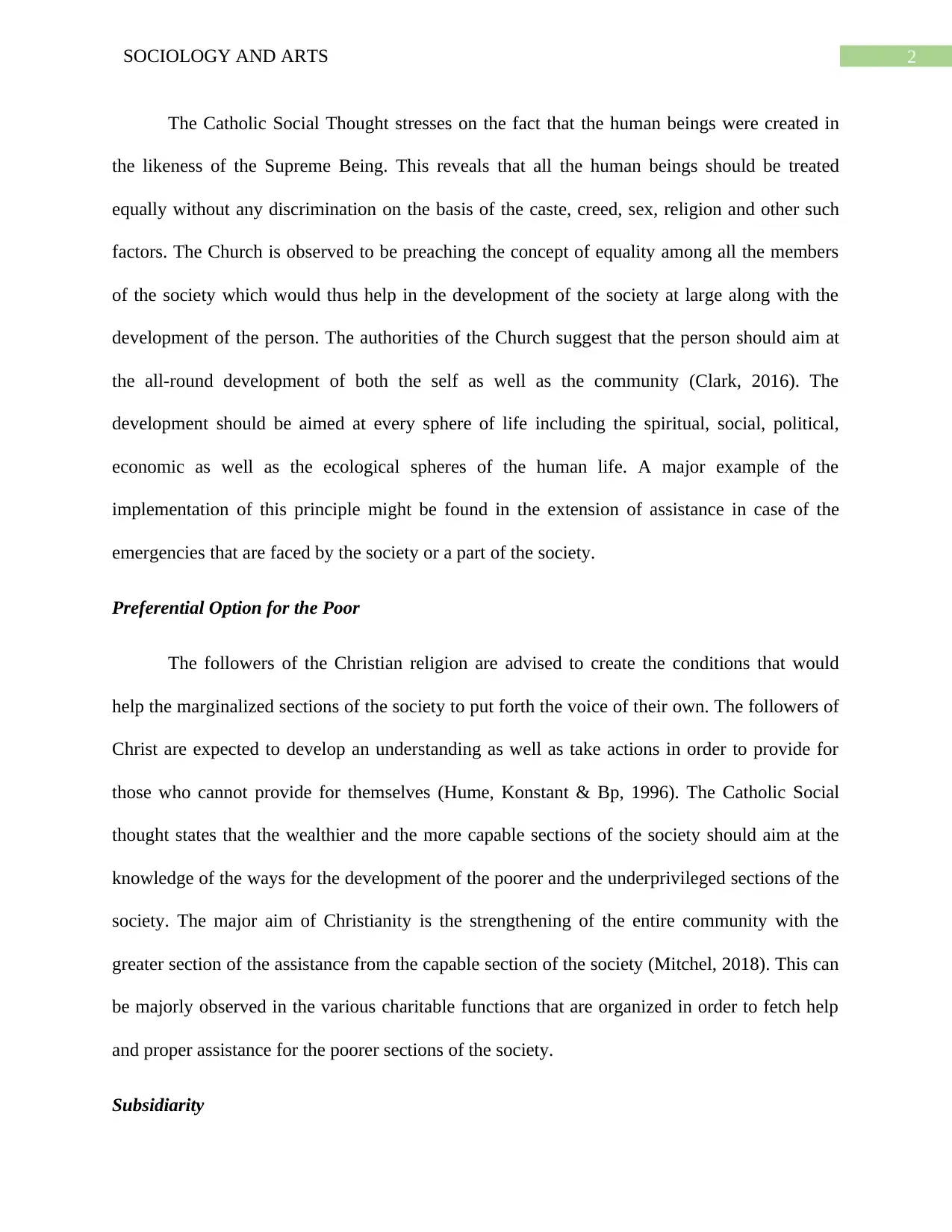
2SOCIOLOGY AND ARTS
The Catholic Social Thought stresses on the fact that the human beings were created in
the likeness of the Supreme Being. This reveals that all the human beings should be treated
equally without any discrimination on the basis of the caste, creed, sex, religion and other such
factors. The Church is observed to be preaching the concept of equality among all the members
of the society which would thus help in the development of the society at large along with the
development of the person. The authorities of the Church suggest that the person should aim at
the all-round development of both the self as well as the community (Clark, 2016). The
development should be aimed at every sphere of life including the spiritual, social, political,
economic as well as the ecological spheres of the human life. A major example of the
implementation of this principle might be found in the extension of assistance in case of the
emergencies that are faced by the society or a part of the society.
Preferential Option for the Poor
The followers of the Christian religion are advised to create the conditions that would
help the marginalized sections of the society to put forth the voice of their own. The followers of
Christ are expected to develop an understanding as well as take actions in order to provide for
those who cannot provide for themselves (Hume, Konstant & Bp, 1996). The Catholic Social
thought states that the wealthier and the more capable sections of the society should aim at the
knowledge of the ways for the development of the poorer and the underprivileged sections of the
society. The major aim of Christianity is the strengthening of the entire community with the
greater section of the assistance from the capable section of the society (Mitchel, 2018). This can
be majorly observed in the various charitable functions that are organized in order to fetch help
and proper assistance for the poorer sections of the society.
Subsidiarity
The Catholic Social Thought stresses on the fact that the human beings were created in
the likeness of the Supreme Being. This reveals that all the human beings should be treated
equally without any discrimination on the basis of the caste, creed, sex, religion and other such
factors. The Church is observed to be preaching the concept of equality among all the members
of the society which would thus help in the development of the society at large along with the
development of the person. The authorities of the Church suggest that the person should aim at
the all-round development of both the self as well as the community (Clark, 2016). The
development should be aimed at every sphere of life including the spiritual, social, political,
economic as well as the ecological spheres of the human life. A major example of the
implementation of this principle might be found in the extension of assistance in case of the
emergencies that are faced by the society or a part of the society.
Preferential Option for the Poor
The followers of the Christian religion are advised to create the conditions that would
help the marginalized sections of the society to put forth the voice of their own. The followers of
Christ are expected to develop an understanding as well as take actions in order to provide for
those who cannot provide for themselves (Hume, Konstant & Bp, 1996). The Catholic Social
thought states that the wealthier and the more capable sections of the society should aim at the
knowledge of the ways for the development of the poorer and the underprivileged sections of the
society. The major aim of Christianity is the strengthening of the entire community with the
greater section of the assistance from the capable section of the society (Mitchel, 2018). This can
be majorly observed in the various charitable functions that are organized in order to fetch help
and proper assistance for the poorer sections of the society.
Subsidiarity
⊘ This is a preview!⊘
Do you want full access?
Subscribe today to unlock all pages.

Trusted by 1+ million students worldwide
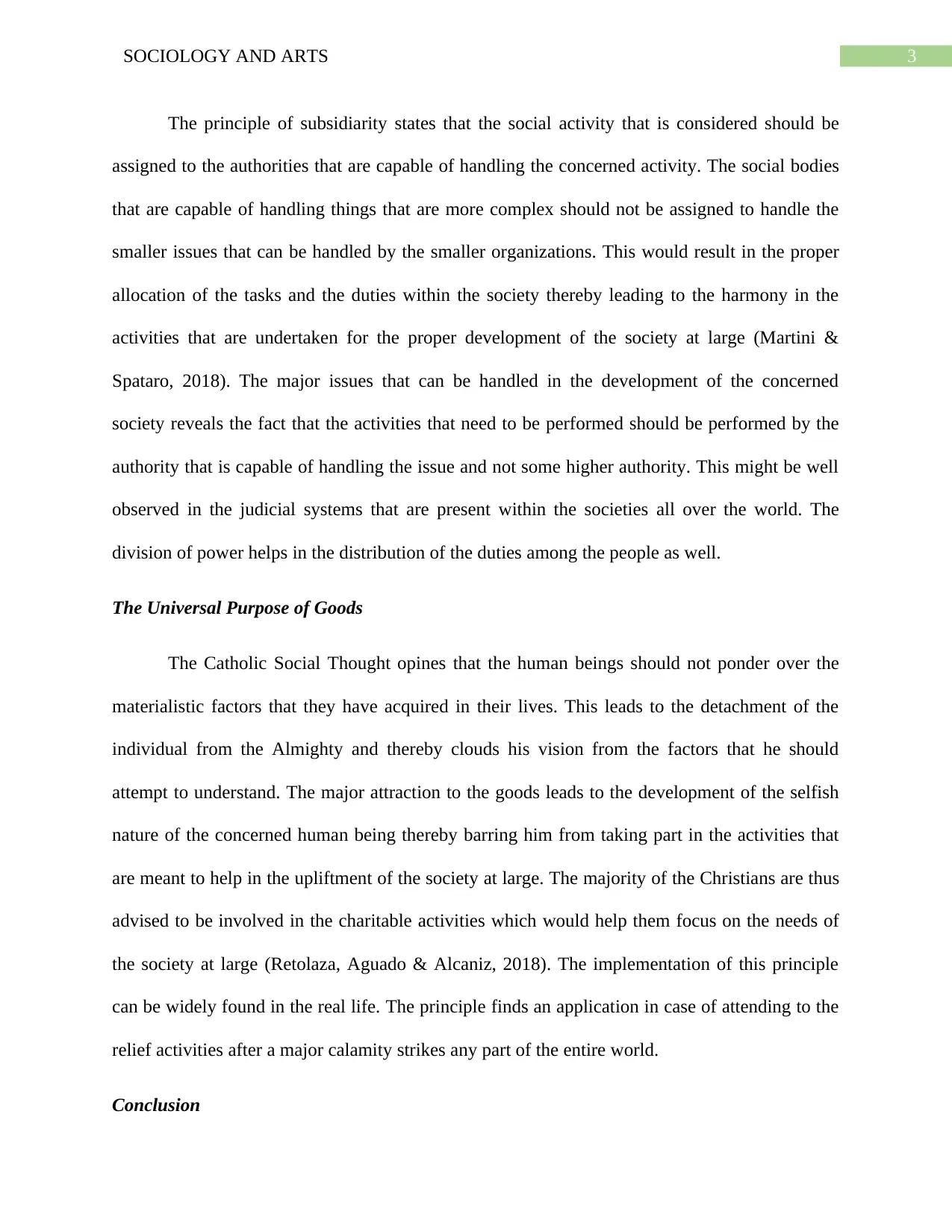
3SOCIOLOGY AND ARTS
The principle of subsidiarity states that the social activity that is considered should be
assigned to the authorities that are capable of handling the concerned activity. The social bodies
that are capable of handling things that are more complex should not be assigned to handle the
smaller issues that can be handled by the smaller organizations. This would result in the proper
allocation of the tasks and the duties within the society thereby leading to the harmony in the
activities that are undertaken for the proper development of the society at large (Martini &
Spataro, 2018). The major issues that can be handled in the development of the concerned
society reveals the fact that the activities that need to be performed should be performed by the
authority that is capable of handling the issue and not some higher authority. This might be well
observed in the judicial systems that are present within the societies all over the world. The
division of power helps in the distribution of the duties among the people as well.
The Universal Purpose of Goods
The Catholic Social Thought opines that the human beings should not ponder over the
materialistic factors that they have acquired in their lives. This leads to the detachment of the
individual from the Almighty and thereby clouds his vision from the factors that he should
attempt to understand. The major attraction to the goods leads to the development of the selfish
nature of the concerned human being thereby barring him from taking part in the activities that
are meant to help in the upliftment of the society at large. The majority of the Christians are thus
advised to be involved in the charitable activities which would help them focus on the needs of
the society at large (Retolaza, Aguado & Alcaniz, 2018). The implementation of this principle
can be widely found in the real life. The principle finds an application in case of attending to the
relief activities after a major calamity strikes any part of the entire world.
Conclusion
The principle of subsidiarity states that the social activity that is considered should be
assigned to the authorities that are capable of handling the concerned activity. The social bodies
that are capable of handling things that are more complex should not be assigned to handle the
smaller issues that can be handled by the smaller organizations. This would result in the proper
allocation of the tasks and the duties within the society thereby leading to the harmony in the
activities that are undertaken for the proper development of the society at large (Martini &
Spataro, 2018). The major issues that can be handled in the development of the concerned
society reveals the fact that the activities that need to be performed should be performed by the
authority that is capable of handling the issue and not some higher authority. This might be well
observed in the judicial systems that are present within the societies all over the world. The
division of power helps in the distribution of the duties among the people as well.
The Universal Purpose of Goods
The Catholic Social Thought opines that the human beings should not ponder over the
materialistic factors that they have acquired in their lives. This leads to the detachment of the
individual from the Almighty and thereby clouds his vision from the factors that he should
attempt to understand. The major attraction to the goods leads to the development of the selfish
nature of the concerned human being thereby barring him from taking part in the activities that
are meant to help in the upliftment of the society at large. The majority of the Christians are thus
advised to be involved in the charitable activities which would help them focus on the needs of
the society at large (Retolaza, Aguado & Alcaniz, 2018). The implementation of this principle
can be widely found in the real life. The principle finds an application in case of attending to the
relief activities after a major calamity strikes any part of the entire world.
Conclusion
Paraphrase This Document
Need a fresh take? Get an instant paraphrase of this document with our AI Paraphraser
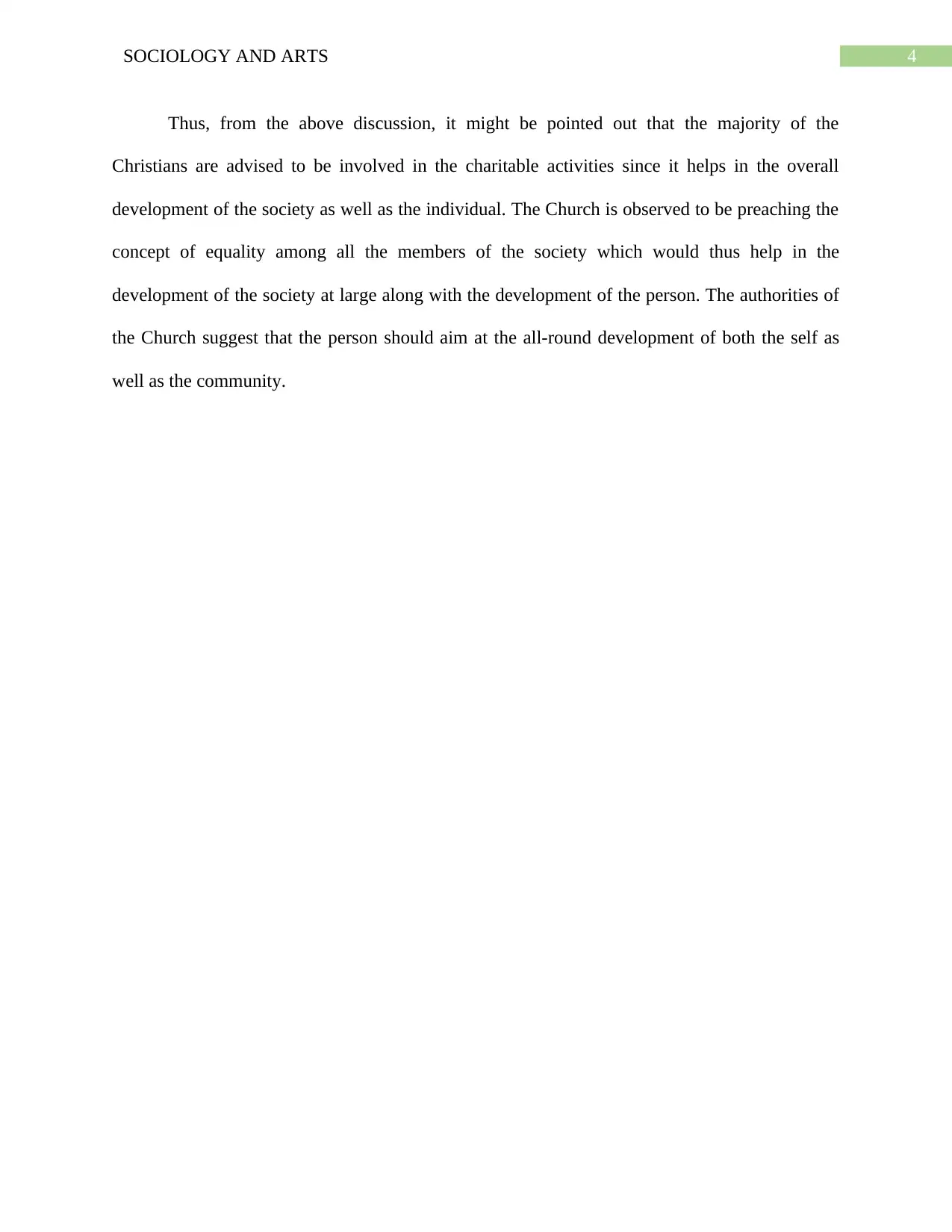
4SOCIOLOGY AND ARTS
Thus, from the above discussion, it might be pointed out that the majority of the
Christians are advised to be involved in the charitable activities since it helps in the overall
development of the society as well as the individual. The Church is observed to be preaching the
concept of equality among all the members of the society which would thus help in the
development of the society at large along with the development of the person. The authorities of
the Church suggest that the person should aim at the all-round development of both the self as
well as the community.
Thus, from the above discussion, it might be pointed out that the majority of the
Christians are advised to be involved in the charitable activities since it helps in the overall
development of the society as well as the individual. The Church is observed to be preaching the
concept of equality among all the members of the society which would thus help in the
development of the society at large along with the development of the person. The authorities of
the Church suggest that the person should aim at the all-round development of both the self as
well as the community.
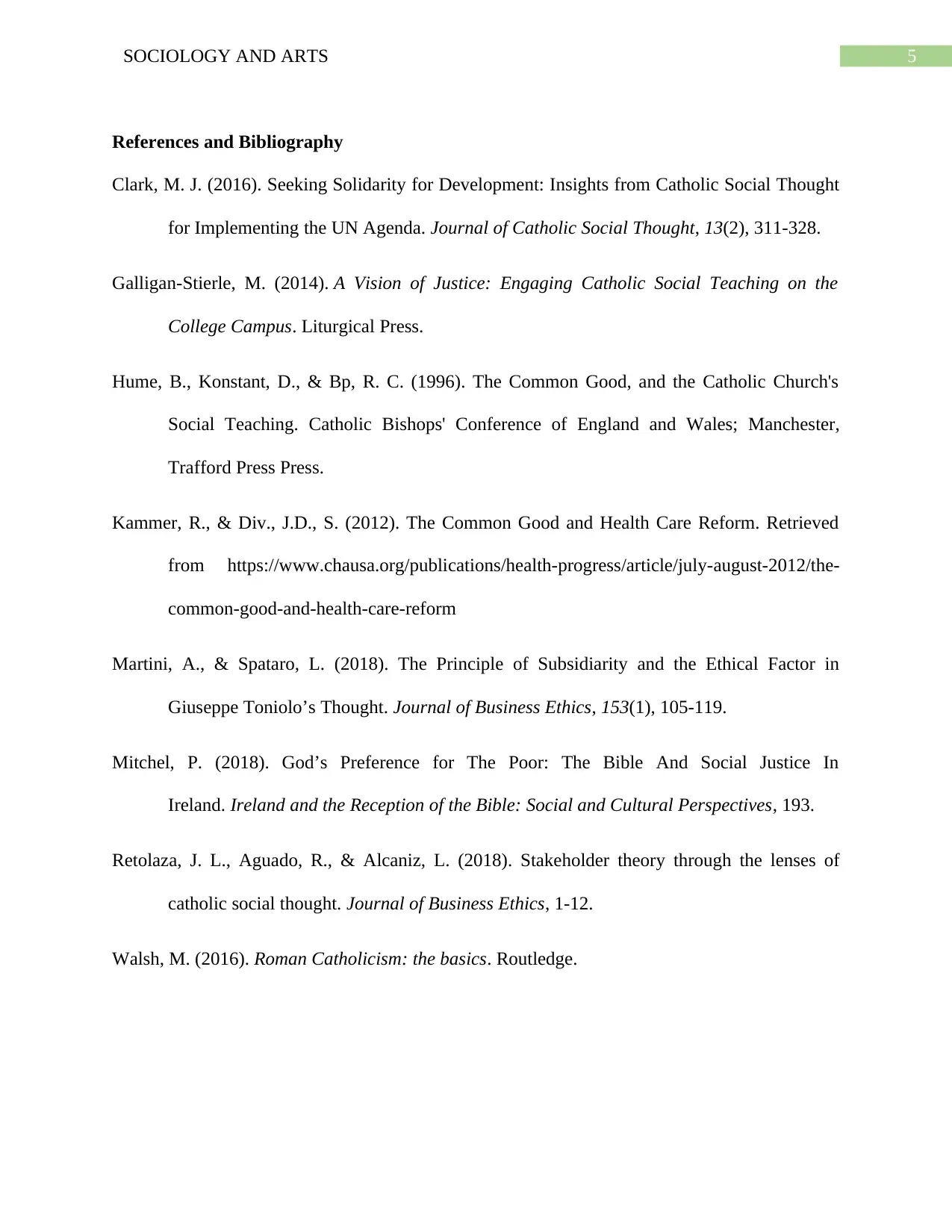
5SOCIOLOGY AND ARTS
References and Bibliography
Clark, M. J. (2016). Seeking Solidarity for Development: Insights from Catholic Social Thought
for Implementing the UN Agenda. Journal of Catholic Social Thought, 13(2), 311-328.
Galligan-Stierle, M. (2014). A Vision of Justice: Engaging Catholic Social Teaching on the
College Campus. Liturgical Press.
Hume, B., Konstant, D., & Bp, R. C. (1996). The Common Good, and the Catholic Church's
Social Teaching. Catholic Bishops' Conference of England and Wales; Manchester,
Trafford Press Press.
Kammer, R., & Div., J.D., S. (2012). The Common Good and Health Care Reform. Retrieved
from https://www.chausa.org/publications/health-progress/article/july-august-2012/the-
common-good-and-health-care-reform
Martini, A., & Spataro, L. (2018). The Principle of Subsidiarity and the Ethical Factor in
Giuseppe Toniolo’s Thought. Journal of Business Ethics, 153(1), 105-119.
Mitchel, P. (2018). God’s Preference for The Poor: The Bible And Social Justice In
Ireland. Ireland and the Reception of the Bible: Social and Cultural Perspectives, 193.
Retolaza, J. L., Aguado, R., & Alcaniz, L. (2018). Stakeholder theory through the lenses of
catholic social thought. Journal of Business Ethics, 1-12.
Walsh, M. (2016). Roman Catholicism: the basics. Routledge.
References and Bibliography
Clark, M. J. (2016). Seeking Solidarity for Development: Insights from Catholic Social Thought
for Implementing the UN Agenda. Journal of Catholic Social Thought, 13(2), 311-328.
Galligan-Stierle, M. (2014). A Vision of Justice: Engaging Catholic Social Teaching on the
College Campus. Liturgical Press.
Hume, B., Konstant, D., & Bp, R. C. (1996). The Common Good, and the Catholic Church's
Social Teaching. Catholic Bishops' Conference of England and Wales; Manchester,
Trafford Press Press.
Kammer, R., & Div., J.D., S. (2012). The Common Good and Health Care Reform. Retrieved
from https://www.chausa.org/publications/health-progress/article/july-august-2012/the-
common-good-and-health-care-reform
Martini, A., & Spataro, L. (2018). The Principle of Subsidiarity and the Ethical Factor in
Giuseppe Toniolo’s Thought. Journal of Business Ethics, 153(1), 105-119.
Mitchel, P. (2018). God’s Preference for The Poor: The Bible And Social Justice In
Ireland. Ireland and the Reception of the Bible: Social and Cultural Perspectives, 193.
Retolaza, J. L., Aguado, R., & Alcaniz, L. (2018). Stakeholder theory through the lenses of
catholic social thought. Journal of Business Ethics, 1-12.
Walsh, M. (2016). Roman Catholicism: the basics. Routledge.
⊘ This is a preview!⊘
Do you want full access?
Subscribe today to unlock all pages.

Trusted by 1+ million students worldwide
1 out of 6
Related Documents
Your All-in-One AI-Powered Toolkit for Academic Success.
+13062052269
info@desklib.com
Available 24*7 on WhatsApp / Email
![[object Object]](/_next/static/media/star-bottom.7253800d.svg)
Unlock your academic potential
Copyright © 2020–2026 A2Z Services. All Rights Reserved. Developed and managed by ZUCOL.





